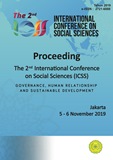POLITICAL PARTICIPATION OF GENERATION Z GROUP OF BEGINNERS AND THE USE OF SOCIAL MEDIA IN JAMBI PROVINCE
Abstract
Generation Z in Indonesia is the first digital native present in Indonesia and will soon shift the millennial generation in various ways. The large number of population and characteristics that are completely different from previous generations makes this group start to become the attention of many parties, this group requires media media different so that the participatory forms can be accommodated properly, this is because it is probable that the existing facilities will be different and not very acceptable to those in this group. Innovative and novelty elements are considered suitable and considered to be able to accommodate political aspirations for this generation Z, most likely not yet popular in Indonesia or only known by this group, and this will be a challenge in the future for all political stakeholders of this country, given the potential which is great for the good of this nation which comes from this generation Z group. In Jambi Province there has been a significant increase in political participation in recent years, this has become interesting because the political sphere in this province seems rigid and elitist. Social media and the rapid penetration of the Internet in the province have accompanied this phenomenon. The purpose of this study was to determine the use of social media and political participation in Generation Z. This study used a survey method with a quantitative descriptive approach and questionnaires distributed online and offline. The results of this study will be sourced from respondents who are the Z generation of beginner groups, and are internet users. This research will try to reach out to respondents from novice voters in several regencies and cities in Jambi province, especially those who are concentrated in various high schools in Jambi province, and are exposed by the Internet and at the same time active social media users. those who will be the response have 2 categories, those who have been involved in the elections in 2018 and 2019 and those who are the first to give their political rights in the next election.Keywords: Generation Z, Political Participation, Beginner Voters, Digital NativeReferences
Amany, Tsamara. (2017). Millenial, Politik, dan Media Sosial. Accessed via https://news.detik.com/kolom/d-3755077/milenial-politik-dan-media-sosial tanggal 8 April 2019.
Andayani, Dwi. (2018). Ada 5 Juta Pemilih Pemula di Pemilu 2019. Accessed by https://news.detik.com/berita/4215354/ada-5-juta-pemilih-pemula-di-pemilu-2019 tanggal 8 April 2019.
Anonym. (2019). Yayasan Tifa Ajak Generasi Muda Gaungkan Toleransi. Accessed by https://www.tifafoundation.org/yayasan-tifa-ajak-generasi-muda-gaungkan-toleransi/ tanggal 8 April 2019.
Andrzej, Kaczmarczyk. (2010). Cberdemocracy: Change of Democratic Paradigm in the 21st Century. Ontario Canada: The Key Publishing House Inc.
Altheide, D.L. (2006). Terrorism and the Politics of Fear. Cultural Studies Critical Studies, volume 6 number X. CA: Sage.
A.Dahl, Robert. (2001). Perihal Demokrasi. Jakarta:Yayasan Obor Indonesia, Jakarta.
Berger, Peter L. (1982). Piramida Korban Manusia. Jakarta: LP3ES.
Biro Pusat Statistik. (2018). Angka Harapan Hidup saat Lahir Menurut Provinsi, 2010-2018 (Metode baru). Accessed by https://www.bps.go.id/dynamictable/2018/04/16/1298/angka-harapan-hidup-saat-lahir-menurut-provinsi- tanggal 8 April 2019
Anderson, Benedict. (2001) Imagined Communities: Komunitas-Komunitas Terbayang. Yogyakarta: INSIST –Pustaka Pelajar
Bond Livity. (2015). Engaging Generattion Z Motivating Young People to Engage Positively with International Development
Diakses melalui https://www.bond.org.uk/resources/engaging-generation-z tanggal 8 April 2019.
Cyrusnetwork. (2019). Laporan Survey Nasional: Pemetaan Peluang Capres dan Cawapres menjelang pemilihan Presiden 2019”. Jakarta: Cyrusnetwork.
Darity Jr. (1972). “International Encyclopedia of the Social Sciences”, Edisi Kedua, 1972 terjemahan 2015.
Generational Kinetics. (2018). Annual Gen Z Research. Diakses melalui https://genhq.com/about-the-center-for-generational-kinetics/ tanggal 8 April 2019
Glassner, B. (2004) “Narrative Techniques of Fear Mongering”. Social Research, 71.
Huntington dan Joan Nelson. (1990). Partisipasi Politik di Negara Berkembang. Jakarta: Rineka Cipta.
Homan, Audrey. (2015). Z is for Generation Z. diakses melalui https://tiie.w3.uvm.edu/blog/who-are-generation-z/#.XMW7yKSZHIU tanggal 8 April 2019.
Komnasham. (2019). Banyak Warga yang Terancam Tidak Bisa Memilih. Diakses melalui.https://www.komnasham.go.id/index.php/rekam media/2019/03/22/80/komnas-ham-banyak-warga-terancam- tanggal 8 April 2019
Mccrindle. (2019). Generatin Z Defined: Global, Visual, Digital. Diakses melalui https://mccrindle.com.au/insights/blogarchive/generation-z-defined-global-visual-digital/ tanggal 8 April 2019
Merlyna Lim. (2005). Archipelago Online, The Internet and Political Activism in Indonesia. Thesis. Netherlands. University of Twente.
Marc Prensky. Digital Natives Digital Immigrants. MCB University Press, Vol. 9 No. 5, October 2001. Pg 1-6
News Northeastern. (2014). Generation Z is Entrepenurial, Wants to Chart its Own Future. Diakses melalui https://news.northeastern.edu/2014/11/18/generation-z-survey/ tanggal 8 April 2019.
Said, Gatara dan said Dzullkiah. (2007). Sosiologi Politik Konsep dan Dinamika Perkembangan Kajian. Bandung : CV Pustaka Setia.
Taspcott, Don (2008). Grown Up Digital: How the Net Generation is Changing Your World. New York: US McGraw-Hill.
Karl Manheim in: Paul Kecskemeti (ed.). The Problem of Generation” Karl Mannheim: Essays (Routledge, 1952,republished 1972), 276-322; 22-24 (introduction).
Kementrian Pemberdayaan Perempuan & Perlindungan Anak. (2018). Profil Generasi Millenial Indonesia. Jakarta: Kementerian Pemberdayaan Perempuan dan Perlindungan Anak,
Kominfo. (2018). Pengguna Internet di Indonesia Capai 82 Juta. Diakses melalui https://kominfo.go.id/content/detail/3980/kemkominfo-pengguna-internet-di-indonesia-capai-82-j juta/0/berita_satker tanggal 8 April 2019.


